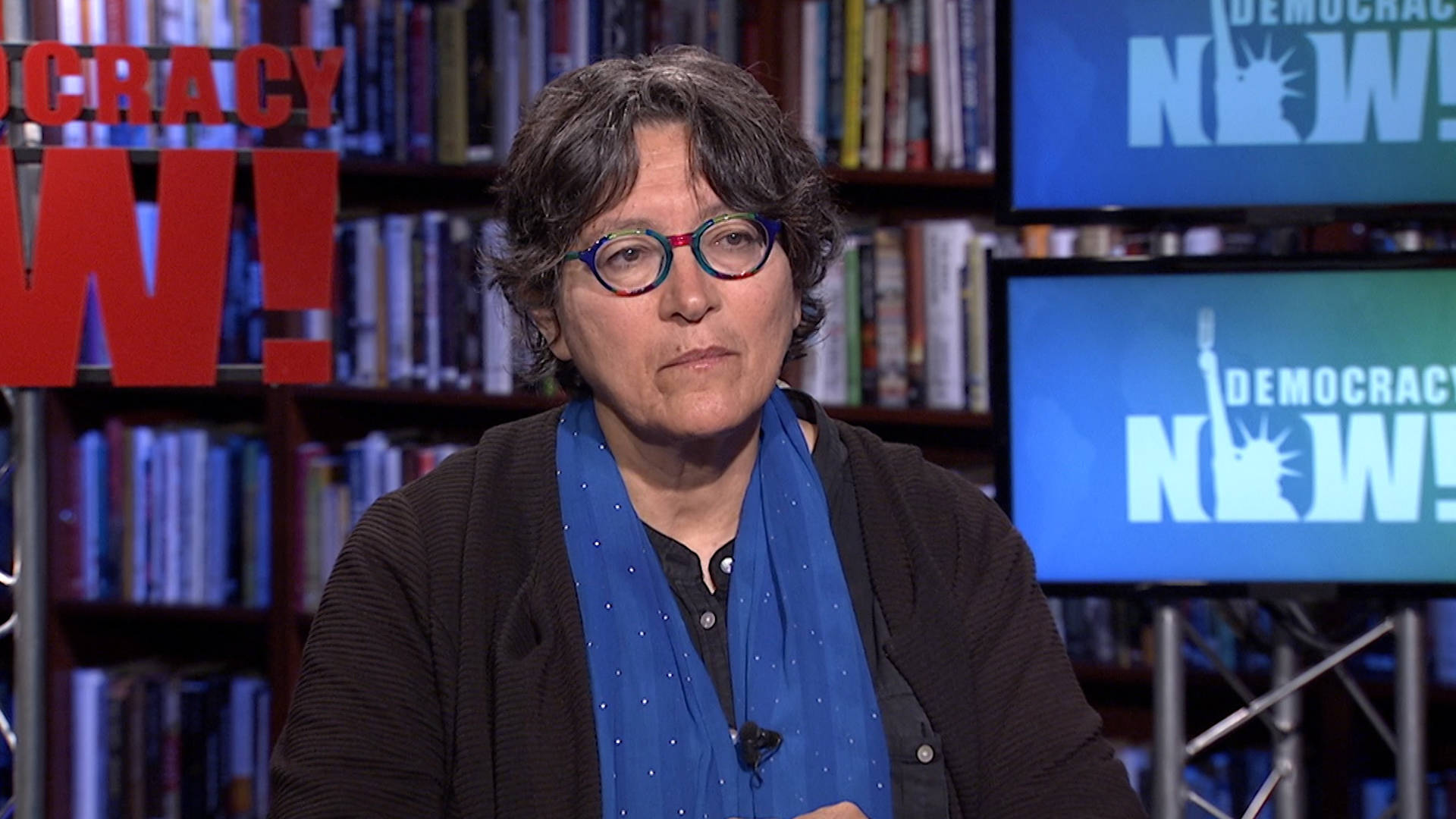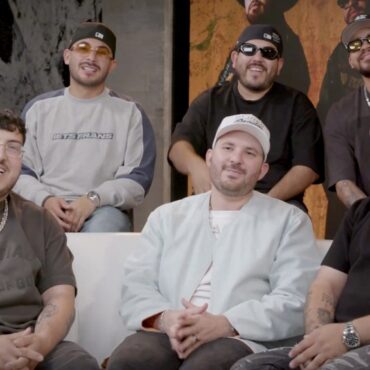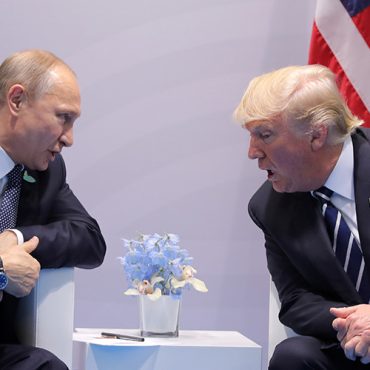This is a rush transcript. Copy may not be in its final form.
AMY GOODMAN: This is Democracy Now!, democracynow.org, The War and Peace Report. I’m Amy Goodman.
Israel is intensifying its bombardment of the Jabaliya refugee camp in northern Gaza, destroying dozens of residential buildings in heavy airstrikes overnight and pushing residents to flee to other parts of the city. This comes as Israel is vowing to escalate its ground attack in the southernmost city of Rafah, with Israeli Defense Minister Yoav Gallant saying Thursday additional troops would enter Rafah and that military operations will intensify in the city. Israeli Prime Minister Benjamin Netanyahu also said Thursday, quote, “The battle in Rafah is critical,” unquote.
One-point-four million Palestinians — over half of Gaza’s population — had been displaced to Rafah seeking shelter. Now more than 600,000 have fled Rafah over the past week and a half since Israel launched its ground offensive there. Since then, no food, fuel or other aid has entered the two main border crossings in southern Gaza, further exacerbating the humanitarian crisis. Some 1.1 million Palestinians are on the brink of starvation, according to the U.N., while a full-blown famine is taking place in the north, this confirmed by the World Food Programme.
The developments come as the International Court of Justice has wrapped up two days of hearings in The Hague after South Africa’s request last week for emergency measures to halt Israel’s assault on Rafah. It marked the third time the U.N.’s top court held hearings on Gaza since South Africa filed a case in December accusing Israel of committing genocide. On Thursday, South Africa’s ambassador to the Netherlands, Vusimuzi Madonsela, urged the court to order Israel to “totally and unconditionally withdraw” from the Gaza Strip.
VUSIMUZI MADONSELA: When we last appeared before this court to halt this genocidal process, to preserve Palestine and its people, instead, Israel’s genocide has continued apace and has just reached a new and horrific stage. Israel has sought to hide its crimes through the weaponization of international humanitarian law. It pretends that the civilians it ruthlessly kills, through its 2,000-pound bombs, through its targeted airstrikes, through its artificial intelligence systems, through its executions, are human shields. This whitewashing of Israel’s genocide misses the key and fundamental element, that of the massive and still mounting evidence of Israel’s genocidal intent.
AMY GOODMAN: Israel presented its defense at the World Court today and denied it’s carrying out a genocide in Gaza. This is the head of the Israeli delegation to the court, Gilad Noam.
GILAD NOAM: South Africa presents the court yet again, for the fourth time within the scope of less than five months, with a picture that is completely divorced from the facts and circumstances. Israel is engaged in a difficult and tragic armed conflict. South Africa ignores this factual context, which is essential in order to comprehend the situation, and also ignores the applicable legal framework of international humanitarian law. It makes a mockery of the heinous charge of genocide.
AMY GOODMAN: The International Court of Justice today ordered representatives for Israel to submit more information about humanitarian conditions in its so-called evacuation zones in Gaza. This comes as foreign ministers from 13 countries have signed onto a letter warning Israel to halt its ground operations in Rafah and to get more aid to Palestinians. The letter is signed by all G7 members minus the United States.
For more, we’re joined by longtime Israeli journalist Amira Hass. Born in 1956 in Jerusalem, her parents Holocaust survivors, she’s the Haaretz correspondent for the Occupied Palestinian Territories, based in Ramallah. She’s the only Israeli Jewish journalist to have spent 30 years living in and reporting from Gaza and the West Bank. Her books include Drinking the Sea at Gaza: Days and Nights in a Land Under Siege. Amira Hass is the recipient of the 2024 Columbia Journalism Award. And on Wednesday, she addressed the graduating class of the Columbia Journalism School here in New York. She now joins us in our New York studio.
Amira, welcome to Democracy Now!
AMIRA HASS: Thank you, Amy.
AMY GOODMAN: Congratulations on your award, but more importantly on your reporting. You are so unusual in Israel as the only Israeli Jewish journalist who lived in the Occupied Territories for the last 30 years. As you gave your address to the Columbia Journalism School, a number of its students threatened by New York police to even step outside the school when they were trying to cover the Gaza Solidarity Encampment outside, as police moved in, and, ultimately, I think, the number of arrests on campus numbered more than 200. Can you talk about the coming together of the issues that you cover, and what you feel it’s so important that journalists should understand about their role in society?
AMIRA HASS: As I said in my address to the students, it is — if I want to sum it up not in a professional way or like a teacher-like way, is to resist the normalization of evil and of injustice, because we are so used to so — there is so much injustice in this world, not in — everywhere. And we have to use our — the unwritten social contract between us and citizens the world over to scrutinize, to monitor, to challenge power, centers of power, the abusive power. Any power can be abusive or is abusive, only we have the power to at least try and restrain it. I think this is — this should be the role — not the only role, but this should be a main role of journalists, to restrain power, wherever it is being manifested.
AMY GOODMAN: Ever the journalist, in your J school address, you quoted a friend in Gaza. This is particularly important as —
AMIRA HASS: Yeah.
AMY GOODMAN: — what happened just feet from where the school is. If you can tell us who he is —
AMIRA HASS: Yeah.
AMY GOODMAN: — and what he said?
AMIRA HASS: Yeah. Just a few — two weeks before the address, I received a WhatsApp from a friend called Bassam Nasser. I met him in the early ’90s when he was still a student. And we haven’t been in touch for many years. He’s a father of four. He’s heading a aid institution or center in Gaza. He was displaced, like so many others, from Gaza to Rafah to save his life. His house, I know, is in ruins now in Gaza. And now he had to flee again with his family from — and the institution, from Rafah to Deir al-Balah in the center. And he sent me a very — he, from time to time, writes something on WhatsApp in English, and I guess he shares it with some others, and he shares his thoughts and feelings. And he shared with me something concerning the demonstrations and protests in American campuses. And I thought, of course, fit to bring it to the — to read it. So I can read it now. Sorry. And this is from the talk and what I — the quote that I brought on Wednesday to the students.
“A glimmer of hope emerges from university students demonstrating the enduring presence of humanity. Panicked, hypocritical politicians swiftly resort to force in order to quell the movement, fearing its global expansion. Repression is enacted to stifle voices challenging the status quo. Police and National Guards are deployed, arresting students who were expelled just hours earlier for speaking out against the violence in Palestine. From Gaza to New York and other major cities worldwide, I want to express deep gratitude for these voices. While you may not be able to save every child in Gaza or restore our shattered lives and dreams, and your efforts won’t prevent the next devastating airstrike that will wipe out our entire family, on behalf of every Palestinian, I want to express heartfelt appreciation for raising awareness to our plight.” And I know he’s not the only one. I mean, I know that if there was some kind of, really, a ray of hope in people’s life in — people’s hell — it’s not life — in the last month, are those demonstrations and protests.
AMY GOODMAN: Now, I wanted to go to someone else talking about those protests. You gave your graduation address on Wednesday at the Columbia Journalism School. The president, Minouche Shafik, had canceled the main graduation ceremony because of the protests. But yesterday, faculty, to say the least, completely exhausted, organized a People’s Graduation. Columbia students and faculty celebrated an alternative People’s Graduation as they gathered for a ceremony just nearby at the Cathedral of St. John the Divine, with many students wearing their blue graduation gowns. On the stage with the professors was the Reverend Herbert Daughtry, the New York civil rights leader who was an early mentor to now-Mayor Eric Adams, who’s claimed the protests at Columbia were, quote, “coopted by professional outside agitators.” But among the speakers who addressed the students was the poet Fady Joudah, who read his poem, “Dedication,” about Palestinians killed by Israel; the Palestinian American lawyer and human rights activist Noura Erakat; and the award-winning journalist Mona Chalabi, who has rejected her 2023 Pulitzer Prize and has been highly critical of Gaza coverage by mainstream U.S. media outlets. In her address, she paid tribute to the student journalists in the audience who covered the Gaza encampment, often while facing arrest themselves.
MONA CHALABI: Hi, habibis. I’m just going to talk to you for two minutes, because I have the huge honor of acknowledging my fellow journalists in the room. So, as many of you know, our institutions have failed us these past seven months, and long before that. Writers and editors at some of the most respected newsrooms have told lies about what is happening in Gaza. They have said that death threats falling from the skies are evacuation orders. They have described forced displacement as migration. They have issued warnings to their staff, telling them not to use words like “ethnic cleansing” or “genocide.” In short, they’ve used their reporting to minimize the suffering in Gaza and maintain a status quo. And they’ve had that reporting honored by the Pulitzers. They’ve even sought to —
AUDIENCE: Shame!
MONA CHALABI: They’ve even sought to discredit or ignore Palestinian journalists, like Hind, who face death every day.
So I shouldn’t have been surprised when I heard what happened last month. A reporter at The New York Times was told that something seemed to be happening at Columbia University. Students appeared to have claimed a lawn as theirs. So, like any breaking news story, a select channel had been created for the journalists to discuss details and assign stories. This is what they do at The New York Times. When this reporter joined the select channel, they were surprised to find that it had been titled “Antisemitism on Campus.” They had decided what the story was before they even took a train uptown.
AUDIENCE: Shame!
MONA CHALABI: Meanwhile, journalists on campus have had a very different perspective. You had begun reporting before a single tent was assembled. You have not only witnessed the encampments, you listened to the chants, you read the signs, and you spoke to the organizers. You did the work, and you did it so well that journalists like me off campus turned to your words, your Instagram accounts, and we listened to your radio stations if we wanted the truth.
And you did that truth telling while cops harassed, assaulted and arrested you and your fellow students. And you did it all while trying to graduate and to grieve. That is true for anti-Zionist Jewish students who were having their faith questioned by those who want them to fall silent. It’s true for students whose parents look like the mothers and fathers being killed every day. And it is especially true for the Palestinian students who continue to report the facts while navigating unbearable grief. I am so proud to call you my colleagues. Would the journalists in the room please stand?
AMY GOODMAN: That’s the award-winning journalist Mona Chalabi, who just won the 2023 Pulitzer Prize, though she rejected it. At the award ceremony, Mona called out fellow journalists for their unwillingness to say the word “Palestine.” She donated her $15,000 prize money to the Palestinian Journalists Syndicate to help fight what she talked about as the asymmetry of information that elevates Israeli voices over Palestinian ones in the mainstream media. She was addressing the People’s Graduation yesterday at St. John the Divine for the Columbia and Barnard students.
Amira Hass, as you listen to Mona and you think about also the Palestinian journalists who have died in Gaza, the astounding number of journalists who have died —
AMIRA HASS: Who have been killed.
AMY GOODMAN: Who have been killed.
AMIRA HASS: Yeah.
AMY GOODMAN: Talk about that, then. And do you feel that they were directly targeted, so often wearing the press vests and the helmets?
AMIRA HASS: Yeah.
AMY GOODMAN: I remember one Palestinian journalist, as he heard about his dear friend just having been killed, ripped off his press and helmet and said, “Why are we wearing these? They just make us a target.”
AMIRA HASS: Yeah. I guess, you know, one part in me wants to think that this is not true, I mean, that they were killed because they are in places which are dangerous and because they circulate a lot, I mean, move around in times when people try not to move around. I think there is what we call a finger — I think, a fingerprint targeting or profiling, because anybody who uses a drone, even for filming, for photographing, is considered by the people behind the Israeli assaulting drones, or Predator drones, as somebody who is part of the fighting units, so they kill them automatically without checking if they are only taking photos. So, I think there is a variety of excuses or explanation that Israel would give. But certainly, in some cases, they were connecting journalists to the 7th of October or to other activities completely not as journalists and wanting to take revenge of them. But this has to be checked, and I think it is being checked by several venues, each one case.
But certainly, when there are so many people, so many journalists killed, it shows that there is a pattern. And our role is to discover the pattern. But there are patterns of other things. There are patterns of whole families who are being killed, so 40, 30, 35. So, you can say that you are targeting one of the family, which means that you allow the killing of — let’s say that this one person is very dangerous to the security of Israel. Then it means that you allow yourself to kill 30 people, 40 people, 25 people, including children, including babies, for one person. So this is a pattern. We can learn about it from the reality. We don’t need to have secret documents for it. But it was so. There is a very important investigation by Yuval Abraham of +972, who did talk to intelligence, soldiers in the intelligence, and proved that there is an Israeli OK to kill so-and-so many for one person.
AMY GOODMAN: And we interviewed Yuval —
AMIRA HASS: Yeah.
AMY GOODMAN: — on Democracy Now! talking about the AI programs Lavender and Where’s Daddy?
AMIRA HASS: Yes, yeah, yeah.
AMY GOODMAN: So, you have the killing of journalists and then the banning of journalists. And I wanted to go for a moment — I think it was two days after World Press Freedom Day that Israel banned Al Jazeera inside —
AMIRA HASS: Israel.
AMY GOODMAN: — the country, police officers raiding the network’s Jerusalem bureau, seizing broadcast equipment. Over the past seven months, Al Jazeera, one of the only international outlets with reporters on the ground inside Gaza — a few of whom were killed. This is a prerecorded video message by Al Jazeera’s Imran Khan from East Jerusalem.
IMRAN KHAN: If you’re watching this prerecorded report, then Al Jazeera has been banned in the territory of Israel. On April the 1st, the Knesset, the Israeli parliament, passed a law that allowed the prime minister to ban Al Jazeera. He’s now enacted that law.
Let me just take you through some of the definitions within the law. They’ve banned our website, including anything that has the option of entering or accessing the website, even passwords that are needed, whether they’re paid or not, and whether it’s stored on Israeli servers or outside of Israel. The website is now inaccessible. They’re also banning any device used for providing content. That includes my mobile phone. If I use that to do any kind of news gathering, then the Israelis can simply confiscate it. Our internet access provider, the guy that simply hosts AlJazeera.net, is also in danger of being fined if they host the website. The Al Jazeera TV channel, completely banned. Transmission by any kind of content provider is also banned, and holding offices or operating them in the territory of Israel by the channel. Also, once again, any devices used to provide content for the channel can be taken away by the Israelis.
It’s a wide-ranging ban. We don’t know how long it will be in place for, but it does cover this territory of the state of Israel.
Imran Khan, Al Jazeera, occupied East Jerusalem.
AMY GOODMAN: And that was his last report from occupied East Jerusalem. Now Al Jazeera reporters say, when they’re reporting from, for example, Amman, “We are banned from Israel.” But interestingly, Amira Hass, you don’t have the same thing happening with CNN and MSNBC. No, they’re not banned from reporting in Israel, but they are not allowed by Israel to go into Gaza. And each time they have a report outside of Gaza, they don’t say, “And we want to remind you, we are not on the ground in Gaza because the Israeli government has prevented that.”
AMIRA HASS: I cannot — I don’t watch them when I’m in Ramallah. But I want to say that when it comes to the Israeli public, it doesn’t matter if Al Jazeera are inside Israel or not inside Israel. The general Israeli public does not want to know about what’s happening in Gaza. And the Israeli media does not show anything. I mean, they show very, very, very few images of the destruction. They give very little information and footage of the death, of the wounded people. I mean, there is no relation between what is happening and what is shown on Al Jazeera and what the Israeli media shows.
But it is not — it is not a dictate from above. It is not state censorship, unlike with Al Jazeera. It is a decision of most of the Israeli venues, most of the Israeli media venues, especially the TV, of course, not to show those horrible scenes, that might give some sense to some Israelis that this is, not morally, but this is — logically, cannot produce — cannot produce a change in Palestinian attitudes or a change for accepting Israel or accepting Israeli right to exist, etc., etc., for eight months it launches such an onslaught of revenge and supremacy against them. But the Israeli public is not looking for it, is not searching for it, in general. I mean, of course there are exceptions, like the Israeli left wing, Israeli activists, Israeli human rights activists, political leftist activists. Of course, there are exceptions, so it’s not the entire society. And, of course, there are the Palestinians who are Israeli citizens. But the banning of Al Jazeera is not the reason why Israelis do not see — do not see the reality in Gaza. And this is not the reason. This is the choice not to know.
AMY GOODMAN: Interestingly, hostage families — you don’t even see in the U.S. media hostage families saying, “End this war.” You certainly see them talking about the horror of —
AMIRA HASS: Yeah.
AMY GOODMAN: — their loved ones being held in Gaza. But the second part of it, for a number of these hostage families, are “End the war now.”
AMIRA HASS: Yeah, number, not all, but number, yes, of course. But this is the American media. I mean, it’s not — we do know that there are families among the hostage families that do speak differently than the choir.
AMY GOODMAN: I want to ask you about the Nakba, about what happened in 1948 and what’s happening today, when we come back from break. We’re speaking with longtime Israeli journalist Amira Hass, Haaretz correspondent for the Occupied Palestinian Territories. She’s based in Ramallah. And she lived in Gaza for three years, wrote a book called Drinking the Sea at Gaza: Days and Nights in a Land Under Siege. She’s the only Israeli journalist to have lived in the Occupied Territories for decades. Stay with us.
[break]











Post comments (0)